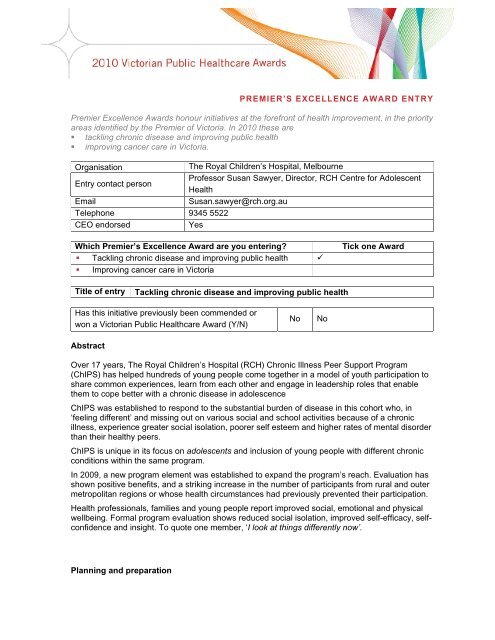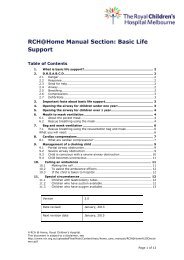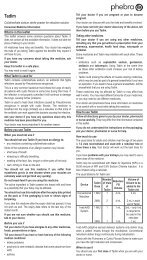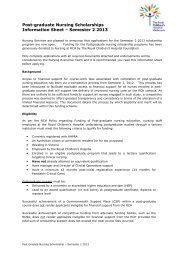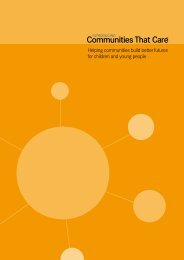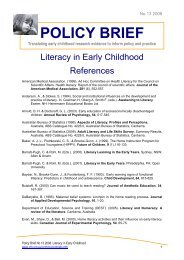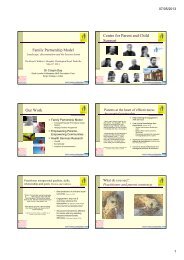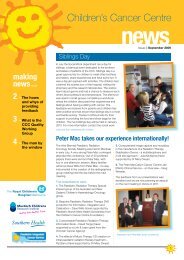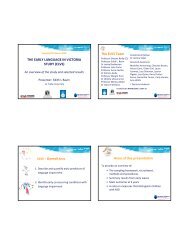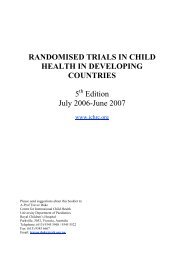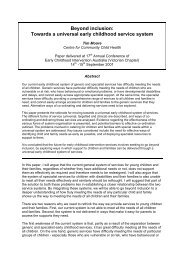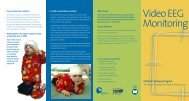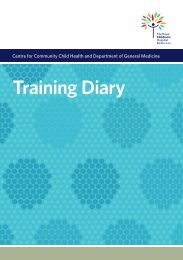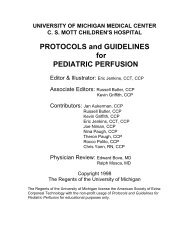Chronic illness peer support program - The Royal Children's Hospital
Chronic illness peer support program - The Royal Children's Hospital
Chronic illness peer support program - The Royal Children's Hospital
Create successful ePaper yourself
Turn your PDF publications into a flip-book with our unique Google optimized e-Paper software.
PREMIER’S EXCELLENCE AWARD ENTRY<br />
Premier Excellence Awards honour initiatives at the forefront of health improvement, in the priority<br />
areas identified by the Premier of Victoria. In 2010 these are<br />
• tackling chronic disease and improving public health<br />
• improving cancer care in Victoria.<br />
Organisation<br />
<strong>The</strong> <strong>Royal</strong> Children’s <strong>Hospital</strong>, Melbourne<br />
Entry contact person<br />
Professor Susan Sawyer, Director, RCH Centre for Adolescent<br />
Health<br />
Email<br />
Susan.sawyer@rch.org.au<br />
Telephone 9345 5522<br />
CEO endorsed<br />
Yes<br />
Which Premier’s Excellence Award are you entering?<br />
• Tackling chronic disease and improving public health <br />
• Improving cancer care in Victoria<br />
Tick one Award<br />
Title of entry<br />
Tackling chronic disease and improving public health<br />
Has this initiative previously been commended or<br />
won a Victorian Public Healthcare Award (Y/N)<br />
Abstract<br />
No<br />
No<br />
Over 17 years, <strong>The</strong> <strong>Royal</strong> Children’s <strong>Hospital</strong> (RCH) <strong>Chronic</strong> Illness Peer Support Program<br />
(ChIPS) has helped hundreds of young people come together in a model of youth participation to<br />
share common experiences, learn from each other and engage in leadership roles that enable<br />
them to cope better with a chronic disease in adolescence<br />
ChIPS was established to respond to the substantial burden of disease in this cohort who, in<br />
‘feeling different’ and missing out on various social and school activities because of a chronic<br />
<strong>illness</strong>, experience greater social isolation, poorer self esteem and higher rates of mental disorder<br />
than their healthy <strong>peer</strong>s.<br />
ChIPS is unique in its focus on adolescents and inclusion of young people with different chronic<br />
conditions within the same <strong>program</strong>.<br />
In 2009, a new <strong>program</strong> element was established to expand the <strong>program</strong>’s reach. Evaluation has<br />
shown positive benefits, and a striking increase in the number of participants from rural and outer<br />
metropolitan regions or whose health circumstances had previously prevented their participation.<br />
Health professionals, families and young people report improved social, emotional and physical<br />
wellbeing. Formal <strong>program</strong> evaluation shows reduced social isolation, improved self-efficacy, selfconfidence<br />
and insight. To quote one member, ‘I look at things differently now’.<br />
Planning and preparation
A significant proportion of patients at the RCH are adolescents aged 12-19 with severe chronic<br />
disease and disability. This ranges from common conditions such as diabetes to rare genetic<br />
conditions. Proportionally, more adolescents than children have chronic conditions.<br />
In 1993, the Centre for Adolescent Health identified that the social and emotional needs of a<br />
number of adolescent patients with severe chronic <strong>illness</strong> were not being met by traditional health<br />
care models. Many experiences were identified, such as social isolation, that were common<br />
across different diagnoses.<br />
Consultation with adolescents with chronic <strong>illness</strong>, a literature review and expert opinion led to the<br />
development of a “<strong>peer</strong> <strong>support</strong>” group <strong>program</strong> to address these needs by accessing <strong>support</strong><br />
from similar aged <strong>peer</strong>s.<br />
Objectives<br />
<strong>The</strong> ChIPS <strong>program</strong> aims to reduce the overall burden of disease and enhance the health and<br />
well being of young people living with significant chronic <strong>illness</strong>, helping them to<br />
Better adjust to life with a chronic <strong>illness</strong>;<br />
Develop a range of personal abilities;<br />
Increase their sense of control over their health;<br />
Become more active in their community.<br />
A youth participation approach ensures that ChIPS is patient-centred, with a consumer focus<br />
underpinning every aspect of the <strong>program</strong>.<br />
Methods and implementation<br />
Following this process, we invited a small group of adolescents with a variety of chronic <strong>illness</strong>es<br />
to attend a weekly evening pilot group for eight weeks. Through discussion and activities, this<br />
group shared experiences and learned from each other. Feedback was overwhelmingly positive,<br />
with co-facilitation of each group by a young person with a chronic condition identified as a critical<br />
success factor. <strong>The</strong> group <strong>program</strong> commenced!<br />
A recurrent theme from our evaluation was interest in maintaining contact after the group ended.<br />
As a result, social activities were organised for past group participants, with young people who<br />
participated in these activities known as ChIP–ERS (Education, Recreation, Social)<br />
Leadership training was then provided for participants to <strong>support</strong> them organising social activities<br />
and running the groups.<br />
A youth Reference Committee was established which effectively overseas the <strong>program</strong>, informing<br />
all aspects including the planning and delivering of activities via working groups, and engaging<br />
with the broader community through public speaking and newsletters. Working groups are<br />
assisted by mentors (volunteers with an interest in young people and chronic <strong>illness</strong>).<br />
In response to the Reference committee, the ChIPS <strong>program</strong> has grown into a major <strong>program</strong> of<br />
the RCH that now features:<br />
Peer <strong>support</strong> groups<br />
Quarterly social activities<br />
Annual camps<br />
Leadership training<br />
Reference Committee<br />
In the past two years an additional pathway has been introduced – the two day “ChIPS<br />
Intensives”. Analysis of our referrals from mid 2006 through 2008 showed that about 1 in 5 did not<br />
proceed with the <strong>program</strong> because of living too far away, because the nature of their condition
limited their ability to attend a weekly group or because of their inability to function in a weekly<br />
social environment.<br />
Two Intensives were trialled in 2009, that over 2 days aimed to replicate the experience of the 8<br />
week Group. Accommodation was provided to further increase access. Two more Intensives have<br />
been conducted in 2010, which have now become integral to ChIPS.<br />
Results and outcomes (see <strong>support</strong>ing document)<br />
Feedback is sought from all participants in Groups, Intensives and camps which contributes to a<br />
constant cycle of improvement. <strong>The</strong> Reference Committee ensures that young people who have<br />
experienced the various aspects of the <strong>program</strong> provide critical feedback.<br />
Pre- and post-evaluation of participants and parents are powerful, indicating that both group<br />
<strong>program</strong>s<br />
Reduce social isolation;<br />
<br />
<br />
Build leadership skills; and<br />
Provide opportunities to explore positive solutions to living with a chronic <strong>illness</strong> during<br />
adolescence.<br />
One mother recently commented, ‘[My daughter] came out of the group session glowing and for<br />
the first time in her life felt she had found her ‘tribe’. One adolescent recently summed it up by<br />
simply saying, ‘It was brilliant’.<br />
Over 420 young people with significant chronic <strong>illness</strong> have passed through the Groups during the<br />
life of the <strong>program</strong>, with a current membership list of 130. In the 18 months since the first<br />
Intensive, 40 new participants have joined. We have now conducted 4 Group Intensives, whose<br />
participants lived an average of 82 kilometres away. By comparison the participants of the 4 Eight<br />
Week Groups conducted at the same time lived an average of 18 km away.<br />
Graduates of both <strong>program</strong>s are actively engaging in subsequent activities such as social events,<br />
life skills workshops, newsletter production, the annual camp and the Reference Committee;<br />
participation in these activities is less influenced by geography and disease-related concerns.<br />
<strong>The</strong> Centre for Adolescent Health is currently undertaking a detailed research study of the ChIPS<br />
<strong>program</strong>. Using both quantitative and qualitative methods, parents, young people and<br />
stakeholders are informing this evaluation.<br />
Status and sustainability<br />
Through the cycle of youth participation, the <strong>program</strong> is self-sustaining, with a proportion of group<br />
participants remaining active in the planning and delivery of future activities.<br />
ChIPS is funded through a combination of government (Department of Planning and Victorian<br />
Development) and philanthropic funding. It is now an integral component of the RCH’s care of<br />
adolescents with chronic conditions, run by the Centre for Adolescent Health.<br />
Achieving quality, excellence, innovation<br />
<strong>The</strong> promotion of self-management in adults with chronic disease is an established feature of the<br />
health policy landscape. However, despite the prevalence of severe chronic disease in<br />
adolescents, remarkably few <strong>program</strong>s have been developed to <strong>support</strong> the self-management<br />
capacity of adolescents with chronic conditions, who we have shown benefit greatly from the<br />
social inclusivity and leadership experiences of a <strong>peer</strong> <strong>support</strong> <strong>program</strong>.<br />
<strong>The</strong> dominant adult model of self management <strong>support</strong> is disease-specific (eg cancer, arthritis,<br />
diabetes). ChIPS is unique in welcoming young people with different conditions, who we have<br />
shown have far more similarities than differences in being a teenager with a chronic condition.
<strong>The</strong> generic aspects of ChIPS makes it widely applicable, catering for both rare and common<br />
conditions, as well as multiple disorders.<br />
<strong>The</strong> quality and innovation of ChIPS has been recognised through various awards and by seeding<br />
other ChIPS <strong>program</strong>s nationally and internationally (Sydney, London, Vancouver).<br />
ChIPS stands out as a <strong>program</strong> that is built on a model of consumer engagement through youth<br />
participation. Continuous evolution has been a feature which reflects the strength of the model.<br />
In recognising a number of barriers to the 8-week Group, we set out to promote greater access.<br />
<strong>The</strong> Intensive is great value for money; directing the equivalent of 25% of the ChIPS budget to the<br />
Group Intensive translated to a 100% increase in new participants over eighteen months. <strong>The</strong><br />
development of the ChIPS Intensive is another innovation within a wider <strong>program</strong> that has long<br />
represented quality, excellence and innovation.<br />
References<br />
References resulting from the <strong>program</strong><br />
Publications that specifically describe the ChIPS <strong>program</strong><br />
1. SM Sawyer, C Olsson (1999). ‘Supporting young people with chronic <strong>illness</strong>’. <strong>The</strong> Australian<br />
Paediatric Review;9:2-3.<br />
2. C Olsson, SM Sawyer, M Boyce (2000). ‘Do young people with chronic <strong>illness</strong> have special<br />
needs?’ Australian Family Physician;29(1):1-2.<br />
3. C Olsson, L Bond, MW Johnson, DL Forer, MF Boyce, SM Sawyer (2003). ‘Adolescent<br />
chronic <strong>illness</strong>: a qualitative study of psychosocial adjustment’. Annals of the Academy of<br />
Medicine Singapore;32:43-50.<br />
4. CA Olsson, M Boyce, JW Toumbourou, SM Sawyer (2005). ‘<strong>Chronic</strong> <strong>illness</strong> in adolescents:<br />
the role of <strong>peer</strong> <strong>support</strong> groups’. Clinical Child Psychology and Psychiatry; 10:78-87.<br />
5. M Yeo, SM Sawyer (2005). ‘<strong>Chronic</strong> <strong>illness</strong> and disability’. In, ABC of Adolescence. Editor, R<br />
Viner. BMJ Books:16-18.<br />
Publications on chronic <strong>illness</strong> in adolescents that refer to the importance of <strong>peer</strong> <strong>support</strong><br />
<strong>program</strong>s such as ChIPS or that reflect the learnings gained from ChIPS.<br />
6. SM Sawyer (2003). ‘Developmentally appropriate health care for young people with chronic<br />
<strong>illness</strong>: questions of philosophy, policy and practice’. Pediatric Pulmonology; 36(5):363-5.<br />
7. M Yeo, S Sawyer (2005). ‘<strong>Chronic</strong> <strong>illness</strong> and disability’. British Medical Journal;330:721-723.<br />
8. Sawyer SM and Aroni RA (2005). ‘Self-management in adolescents with chronic <strong>illness</strong>. What<br />
does it mean and how can it be achieved?’ Medical Journal of Australia; 405-409.<br />
9. SM Sawyer, S Drew, M Yeo, M Britto (2007). ‘Adolescents with a chronic condition:<br />
challenges living, challenges treating’. Lancet; 369(9571):1481-9.<br />
10. SM Sawyer, S Drew, R Duncan (2007). ‘Adolescents with chronic disease: the double<br />
whammy’. Australian Family Physician;36:2-6.<br />
11. SM Sawyer (2008). ‘In search of quality care for young people with chronic conditions’.<br />
Journal of Paediatrics and Child Health;44(9):475-477.<br />
Electronic media<br />
12. Video for parents. B Tilden (2000). Working with your teenager to manage their medical<br />
condition. Educational video for parents of young people with a chronic condition. Educational<br />
Resource Centre, <strong>Royal</strong> Children’s <strong>Hospital</strong>.<br />
13. SM Sawyer, J Proimos (2001). Adherence in chronic <strong>illness</strong>s: young people tell it as it is.<br />
Educational video for health professionals (Education Resource Centre, <strong>Royal</strong> Children’s<br />
<strong>Hospital</strong>).


